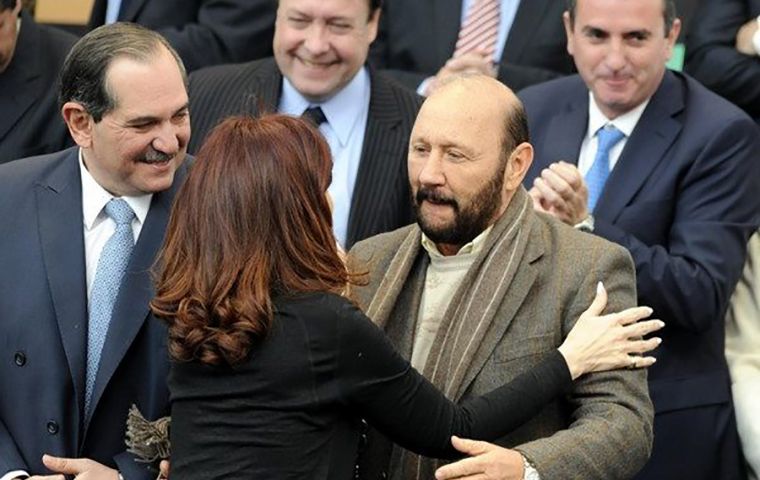MercoPress. South Atlantic News Agency
Cristina Kirchner political ally accused of human rights abuses in the province of Formosa
 Insfran is from the Justicialista Party has been the governor of the province of Formosa since 1995
Insfran is from the Justicialista Party has been the governor of the province of Formosa since 1995 Members of the opposition, international NGO’s and several Catholic and Anglican clerics, have criticized Gildo Insfran, the governor of Formosa, and a close political ally of Cristina Kirchner, for treating those who test positive for the coronavirus and their close contacts in an “inhuman” way, forcing them into public isolation centers for over 20 days.
There are complaints about overcrowding in the facilities, with families being forced to share a single bed, despite other areas allowing people to self-isolate at home.
Insfran is from the Justicialista Party, or “Peronista” and has been the governor of the province of Formosa since 1995. He has long been accused of corruption and self-enrichment, and his tenure has been depicted as a feudal fiefdom that is rife with cronyism, and election rigging.
His administration has been accused of “inhuman treatment” of those forced to quarantine in public spaces. Anyone in Formosa who has tested positive, present symptoms, or has been in close contact with a person with COVID-19 are forced to go into one of the state’s 12 overcrowded isolation centers.
Aligned with the also Peronista President Alberto Fernandez and vice-president Cristina Kirchner, Insfran has the support of the national government, despite several opposition leaders calling for an investigation.
In a Jan. 25 letter made public through social media, 15 Catholic priests from Formosa wrote: “We believe that the provincial government, in its methodology, is not correct.”
“The measures [Insfran] takes are carried out with a level of authoritarianism that reminds us of the dark times of our country, which we don’t want to see repeated, and for this reason, we strongly condemn them,” the priests write.
Jorge Gonzalez, a government minister in Formosa, told a local radio station that the priests “talk of dictatorship, then let’s analyze the role of the Catholic Church in the military dictatorship.”
He then compared the province’s measures of demanding a 14-day quarantine for arrivals into the state to the policy imposed by newly-inaugurated U.S. president, Joe Biden.
Argentina was ruled by the military between 1976 to 1983, after the army overthrew Isabel Perón, the general’s third wife who succeeded him in office after he died in 1974.
An estimated 8,000 people “disappeared” under military rule, with the army often torturing people in clandestine detention centers. Many right-wing members of the clergy had close relations with the military, while others were kidnapped by the army, accused of having ties with Communism.
After over 25 years of Insfran running the province, Formosa continues to be one of the poorest provinces in Argentina’s northern region, with high rates of infant mortality, unemployment, and lack of basic infrastructure.
Amnesty International says the indigenous peoples of the province are victims of “the systemic violation of human rights, the dispossession of ancestral lands, structural poverty and political-state apparatus that marginalizes and coerces indigenous peoples.”
The local Anglican Bishop Nicolás Drayson has asked Insfran to clarify what happened with the violent detention of 15 members of the Wichi community, who were transferred to the capital Formosa almost 400 miles from their places of residence.
The Anglican Church has an important presence in the Wichi community due to its evangelizing work at the beginning of the 20th century in this often-forgotten area of the country. The Catholic Church arrived three decades later.
“Investigate the violent actions committed by the police,” Drayson demanded.
After the coronavirus pandemic began, the situation in Formosa grew even more dire, particularly for those not aligned with Insfran.
Testimony from the coronavirus isolation centers shows the detainees are not able to practice social distancing and have to share toilets and showers.
A lawyer who’s building a case against the provincial government has argued that those in the isolation center are in a “state of uncertainty, panic, anguish and terrible depression.”
Last November, Amnesty denounced the fact that 7,500 people were trapped on the roads trying to enter Formosa, after Insfran imposed a ban on arrivals to keep the region COVID-free. His decision was later overturned by the Supreme Court, allowing people to return home.




Top Comments
Disclaimer & comment rulesCommenting for this story is now closed.
If you have a Facebook account, become a fan and comment on our Facebook Page!